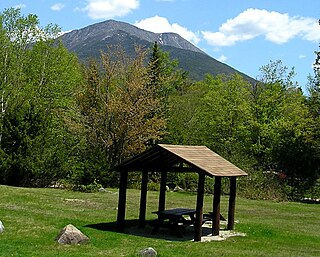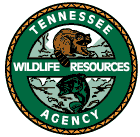The Virginia Department of Wildlife Resources is a department of the government of the U.S. state of Virginia that regulates wildlife conservation.

Baxter State Park is a large wilderness area permanently preserved as a state park in Northeast Piscataquis, Piscataquis County in north-central Maine, United States. It is in the North Maine Woods region and borders the Katahdin Woods and Waters National Monument on the east.

The Kentucky Department of Fish and Wildlife Resources, an agency of the Kentucky Tourism, Arts and Heritage Cabinet, is responsible for the conservation of wildlife resources and for boating projects in the state. A commissioner appointed by the Fish and Wildlife Commission heads the department. The commission—which oversees the department's commissioner and promulgates regulations governing fishing, hunting, and boating—is a nine-member bipartisan board appointed by the governor from a list of candidates nominated by active hunters and anglers in each of nine geographic districts in the state.

The Michigan Department of Natural Resources (DNR) is the agency of the state of Michigan charged with maintaining natural resources such as state parks, state forests, and recreation areas. It is governed by a director appointed by the Governor and accepted by the Natural Resources Commission. Currently the Director is Daniel Eichinger. The DNR has about 1,400 permanent employees, and over 1,600 seasonal employees.

The Texas Parks & Wildlife Department (TPWD) is a Texas state agency that oversees and protects wildlife and their habitats. In addition, the agency is responsible for managing the state's parks and historical areas. Its mission is to manage and conserve the natural and cultural resources of Texas and to provide hunting, fishing, and outdoor recreation opportunities for the use and enjoyment of present and future generations.

The California Department of Fish and Wildlife (CDFW), formerly known as the California Department of Fish and Game (CDFG), is a state agency under the California Natural Resources Agency. The Department of Fish and Wildlife manages and protects the state's wildlife, wildflowers, trees, mushrooms, algae and native habitats (ecosystems). The department is responsible for regulatory enforcement and management of related recreational, commercial, scientific, and educational uses. The department also prevents illegal poaching.

The Tennessee Wildlife Resources Agency (TWRA) is an independent state agency of the state of Tennessee with the mission of managing the state's fish and wildlife and their habitats, as well as responsibility for all wildlife-related law enforcement activities. The agency also has responsibility for fostering the safe use of the state's waters through a program of law enforcement, education, and access.

A conservation officer is a law enforcement officer who protects wildlife and the environment. A conservation officer may also be referred to as an environmental technician or technologist, game warden, forest ranger, forest watcher, forest guard, forester, gamekeeper, investigator, wilderness officer, wildlife officer, or wildlife trooper.
The Alabama Department of Conservation and Natural Resources (ADCNR) is the state agency responsible for the conservation and management of Alabama's natural resources including state parks, state lands, wildlife and aquatic resources. ADCNR also issues hunting and fishing licenses for the state. The department promotes wise stewardship and enjoyment of the state's natural resources through five divisions: Marine Resources, State Lands, State Parks and Wildlife and Freshwater Fisheries. Supporting those divisions are seven support sections: Accounting, Diversity and Recruiting, Engineering, Information and Education, Information Technology, Legal, and Personnel and Payroll.

The Maryland Natural Resources Police (NRP) is the law enforcement arm of the Maryland Department of Natural Resources (DNR), tasked with enforcing laws on the state's public lands and waterways, protecting fish and wildlife, and leading search and rescue efforts. The Natural Resources Police is also the state's maritime homeland security agency.
The North Carolina Wildlife Resources Commission is a state government agency created by the General Assembly in 1947 to conserve and sustain North Carolina's fish and wildlife resources through research, scientific management, wise use, and public input. The Commission is the regulatory agency responsible for the enforcement of N.C. fishing, hunting, trapping and boating laws.

The North American Game Warden Museum is a museum in the International Peace Garden on the Canada–United States international border between the Canadian province of Manitoba and the U.S. state of North Dakota. The museum is located on the American side of the border. Initially founded on a temporary basis at the International Peace Garden in the 1990s, it became a permanent museum in 2005.

The Montana Department of Fish, Wildlife and Parks (MFWP) is a government agency in the executive branch state of Montana in the United States with responsibility for protecting sustainable fish, wildlife, and state-owned park resources in Montana for the purpose of providing recreational activities. The agency engages in law enforcement activities to enforce laws and regulations regarding fish, wildlife, and state parks, and encourages safe recreational use of these resources.

The Massachusetts Environmental Police is a Massachusetts, US, state government law enforcement agency, which is the primary enforcement agency of Massachusetts's boating and recreation vehicle laws and regulations and is responsible for registering boats, off-highway vehicles and snowmobiles in Massachusetts. The agency is also responsible for the enforcement of fish and game laws, including commercial and recreational harvesting of the living marine resources along the state's coastline.

Maine Question 1 (MQ1), "An Act To Prohibit the Use of Dogs, Bait or Traps When Hunting Bears Except under Certain Circumstances", was a citizen-initiated referendum measure in Maine, which was voted on in the general election of November 4, 2014. As the Maine Legislature declined to act on the proposed statute, it was automatically placed on the ballot. The proposal was defeated by 320,873 "No" votes to 279,617 "Yes".

Maine Question 3, formally An Act to Require Background Checks for Gun Sales, was a citizen-initiated referendum question that appeared on the Maine November 8, 2016 statewide ballot. It sought to require a background check for virtually all gun transfers in Maine, with some exceptions. As the Maine Legislature and Governor Paul LePage declined to enact the proposal as written, it appeared on the ballot along with elections for President of the United States, Maine's two United States House seats, the Maine Legislature, other statewide ballot questions, and various local elections.

The Maine Marine Patrol is a maritime police service in the United States State of Maine. It claims to be the oldest law enforcement agency in Maine.
The North Dakota Game and Fish Department is the State of North Dakota's State agency charged with stewardship of the state's fish, game, and wildlife resources. The department sets fish and game regulations, including issuance of hunting and fishing licenses and enforcement of state regulations throughout the state. The department also enforces watercraft regulations and registration, along with enforcement of Invasive species laws.














